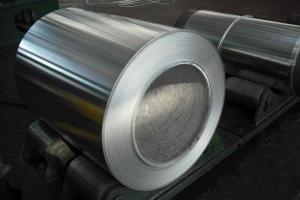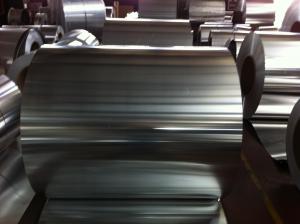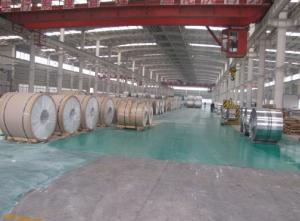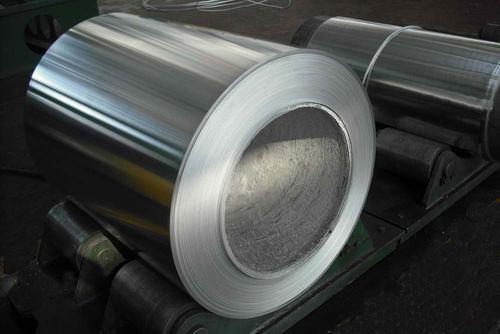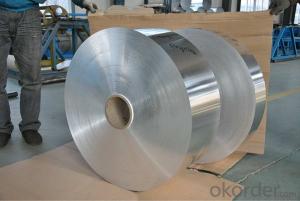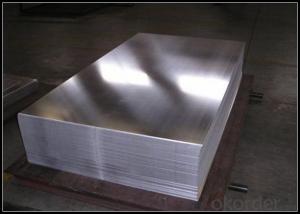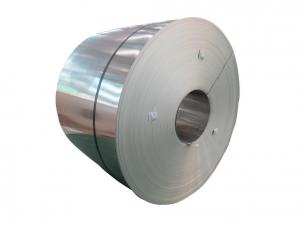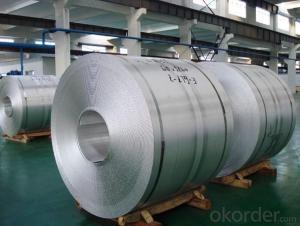5083 Aluminum Coils Wholesale - Continuous Casting Aluminium Coils for Building AA1050
- Loading Port:
- China Main Port
- Payment Terms:
- TT or LC
- Min Order Qty:
- -
- Supply Capability:
- -
OKorder Service Pledge
OKorder Financial Service
You Might Also Like
1.Structure of Product Description
Continuous Casting Aluminium Coils are one semi-finished aluminium material. This strip can be rolled down to aluminium coil,sheet,circle ect. The alloy AA1050 is widly used in building, industry ect. Its weight is much lower than steel. So many customers choosed aluminium material instead of steel. Moreover, the aluminium will not have rust, compared with steel products.
2. Main features of the product
a.Competitive price---We have our own mills and can produce mill finished aluminium coils, so we can control the production cost better.
b.Professional after-sale service---We have more than 15 years exportation experience and you need not worry about the exporation problems.
c.Fast delivery time---We can control the delivery time within 35 days.
3. Image
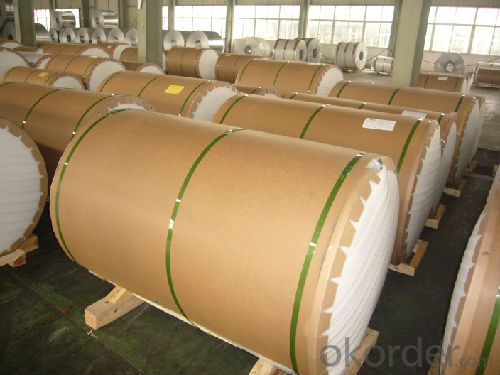
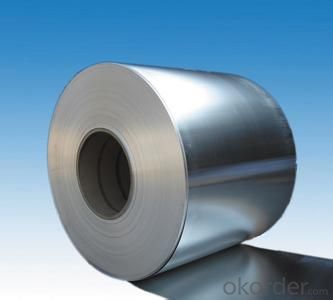
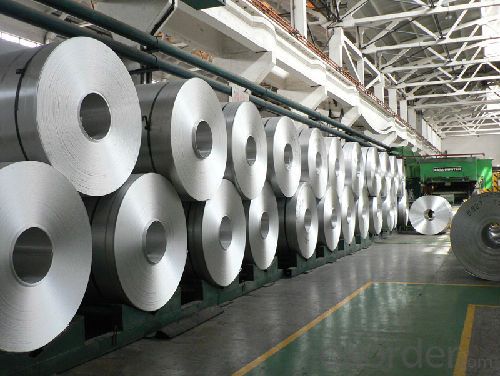
4.Products Specification
| Alloy | Temper | Thickness | Coil ID | Coil Weight |
| AA1050 | F | 3mm-5mm | 610mm+/-10mm | 5-6 tons |
5. FAQ:
What is the quality standard?
---Usually our standard is GB3880-2006
What is the largest width?
---It is 2300mm
What is the MOQ?
---Usually we can accept 80 tons.
- Q: Can aluminum coils be used in the production of heat exchanger fins?
- Yes, aluminum coils can be used in the production of heat exchanger fins. Aluminum is a popular choice for heat exchanger fins due to its high thermal conductivity, lightweight nature, and corrosion resistance. These properties make it an ideal material for transferring heat efficiently while also ensuring durability and longevity. Aluminum coils can be easily formed into intricate fin shapes, maximizing the surface area for heat exchange. Additionally, aluminum is readily available and cost-effective, making it a preferred choice for heat exchanger fin production in various industries such as HVAC, automotive, and refrigeration.
- Q: Explain the distinctions among various welding equipment used specifically for joining aluminum coils.
- <p>Different types of welding equipment for aluminum coils include Gas Tungsten Arc Welding (GTAW), Gas Metal Arc Welding (GMAW), and Resistance Welding (RW). GTAW, also known as TIG welding, uses a non-consumable tungsten electrode and produces high-quality welds with minimal distortion. GMAW, or MIG welding, uses a continuous wire feed as the electrode and is faster but may not be as precise. Resistance Welding involves using electrical current to heat the metals at the joint, which is quick and efficient but not suitable for all aluminum alloys. Each method has its advantages and is chosen based on factors like weld quality, speed, and the specific aluminum alloy being welded.</p>
- Q: 1mm how much is one square meter for aluminum rolls?
- The price of aluminum sheet is calculated according to the price of aluminum ingot + processing fee (aluminum plate state), and the specific price is also different according to the size and size of aluminum sheet.
- Q: Other than alloys. I'm trying to think of a way I can make an aluminum knife that will hold an edge. One group of researches say they used 60 metric tons of force to realign the molecular structure and give the metal strength equal to steel. I don't have a 60 ton press aha. Would heat treatment plus 10 tons of pressure repeated have a similar affect?
- No. You would have to use the exact procedure or use alloys.
- Q: What is the role of aluminum coils in the transportation industry?
- Due to their numerous advantageous properties, aluminum coils play a crucial role in the transportation industry. One of their primary uses is in manufacturing transportation vehicles, including cars, trucks, trains, and airplanes. Aluminum, being a lightweight material with a significantly lower density than steel, is an ideal choice for enhancing fuel efficiency and reducing weight in transportation systems. The use of aluminum coils in transportation vehicles offers several benefits. Firstly, their lightweight nature helps increase fuel efficiency by reducing the energy required for movement. This results in lower fuel consumption, reduced greenhouse gas emissions, and cost savings for transportation companies. Additionally, aluminum coils possess excellent corrosion resistance properties, enabling transportation vehicles to withstand harsh weather conditions such as rain, snow, and exposure to salt. This durability is particularly important for vehicles operating in coastal or snowy areas. The resistance to corrosion also extends the lifespan of the vehicles, reducing maintenance costs. Furthermore, aluminum coils have a high strength-to-weight ratio, making them a reliable choice for structural components in transportation vehicles. This strength allows manufacturers to design lighter and more efficient vehicles without compromising safety or durability. Moreover, the use of aluminum coils contributes to the sustainability efforts of the transportation industry. Aluminum is highly recyclable, and the recycling process requires significantly less energy compared to its initial production. By utilizing aluminum coils in transportation vehicles, the industry can minimize its environmental impact and reduce reliance on non-renewable resources. In conclusion, aluminum coils play a pivotal role in the transportation industry by enhancing fuel efficiency, providing corrosion resistance, enabling lightweight design, offering structural strength, and promoting sustainability. Their use in manufacturing transportation vehicles leads to cost savings, reduced emissions, improved durability, and enhanced overall efficiency in the transportation sector.
- Q: Can aluminum coils be used in food storage facilities?
- Yes, aluminum coils can be used in food storage facilities. Aluminum is a safe and commonly used material for food storage due to its non-reactive properties and resistance to corrosion, making it suitable for maintaining food quality and preventing contamination.
- Q: This question asks about the suitability of aluminum coils for outdoor applications based on their weight and strength.
- <p>Yes, aluminum coils are lightweight and strong, making them suitable for outdoor use. Aluminum is known for its high strength-to-weight ratio, which means it can withstand significant stress without adding much weight. It also has excellent corrosion resistance, which is crucial for outdoor applications where exposure to weather elements can lead to degradation. Additionally, aluminum's malleability allows it to be easily shaped and formed into various configurations for different outdoor structures and applications. Its light weight also reduces the load on structures, which can be an advantage in many construction scenarios.</p>
- Q: What is the temperature range within which aluminum coil can be used?
- <p>Aluminum coil can be used within a wide temperature range, typically from -200掳C to 150掳C. At low temperatures, it retains good ductility and strength, while at higher temperatures, it maintains its form and conductivity. However, it's important to note that prolonged exposure to temperatures above 150掳C can lead to a loss of mechanical properties over time. Always refer to specific product data sheets for precise temperature limits.</p>
- Q: What are the ideal materials for crafting a lampshade and why are they preferred?
- <p>The best material for making a lampshade depends on the desired aesthetic and functional requirements. Fabric is often preferred for its ability to diffuse light and provide a warm glow, with materials like cotton or linen being popular choices for their durability and texture. For a more modern look, materials like acrylic or glass can be used, offering a sleek appearance and the potential for more direct light. Paper is also a good option for its cost-effectiveness and the variety of textures and colors available. Ultimately, the best material is one that complements the lamp's design and the room's d茅cor while fulfilling the necessary light diffusion and safety requirements.</p>
- Q: I am concerned about the environment so I collect empty aluminum cans off the street when I walk my dog. Right now I have 3 large garbage bags full of crushed aluminum can. The problem is... some of the cans have dirt on and in them. Some of thoroughly flattened ones may even have small pebbles embedded in them. Will these be accepted at the recycling facility? I'm guessing it doesn't matter because when they melt them any organic materials will burn away and any dirt particles or small pebbles will be separated from the molten aluminum. What do you think?
- You might need to wash them first.
Send your message to us
5083 Aluminum Coils Wholesale - Continuous Casting Aluminium Coils for Building AA1050
- Loading Port:
- China Main Port
- Payment Terms:
- TT or LC
- Min Order Qty:
- -
- Supply Capability:
- -
OKorder Service Pledge
OKorder Financial Service
Similar products
Hot products
Hot Searches
Related keywords
